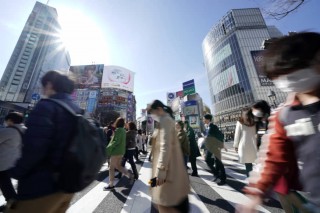Loading
Search
▼ Eye-Catching Japan Equity Rally Splits Wall Street Titans On What Comes Next
- Category:Other
After being seen as one of the worst-performing markets in the developed world, Japan’s recent equity rebound is dividing Wall Street observers on where it will go next.
On the skeptical side, BlackRock Inc. told investors not to chase the rally. Pictet Asset Management Ltd.’s Hiroshi Matsumoto said the nation’s economy remains vulnerable to a potential breakdown in trade talks between the U.S. and China, Japan’s top two trade partners. That’s why it’s too early to give a “green light” to the market, said the head of Japan investment for the $192 billion fund house.
Morgan Stanley and UBS Group AG’s wealth-management unit are among the bulls. Both cite reasons such as cheap valuations and better earnings momentum for turning positive.
And for now, the market has been favoring the optimists, with the benchmark Topix index gaining 3.5 percent this month through Thursday — the second-best advance in the region — while the 225-issue Nikkei average rallied to its highest level in more than a year Thursday.
On Friday, the Nikkei share average inched up 0.2 percent to 22,799.81 for its highest closing level since last October. For the week, it was up 1.4 percent, the third consecutive weekly advance. The broader Topix gained 0.3 percent to 1,648.44, its highest close in 10½ months.
The rally in local share prices came as the U.K. and the European Union struck a long-awaited Brexit deal last week, despite British Prime Minister Boris Johnson facing a deadlock with Parliament over its timing.
Meanwhile, progress in the initial phase of a U.S.-China trade deal also supported shares in Japan.
“Investors had been too negative on Japanese equities due to the concern over the impact of trade tensions,” said Chisa Kobayashi, an analyst at UBS Global Wealth Management CIO. “We see Japanese equities having upside for next year on the back of a recovery in corporate earnings and international investors returning to the market.”
She notes that despite the recent rebound, the shares are still inexpensive. Companies in the Topix index trade at 13 times estimated earnings for the next year, lower than the five-year average, data compiled by Bloomberg show.
Jim McCafferty, Nomura Holdings Inc.’s joint head of Asia-Pacific equity research, says an increase in share buybacks bodes well for the Japanese market. And if earnings momentum becomes positive, Japan wouldbecome more attractive than the U.S., where valuations look increasingly stretched, he said.
Bets are also growing for further central-bank action, which could boost shares even more. Bank of Japan Gov. Haruhiko Kuroda’s call in September for a review of how a global slowdown could threaten its mission to stimulate price growth spurred speculation for a policy move this month.
It’s not just about the fundamentals; the Rugby World Cup and next year’s Olympics will boost Japanese stocks too, according to Sean Darby, global equity strategist with Jefferies Financial Group Inc. The events could help raise awareness of local brands, and “there are a lot of things we could buy in Japan, which are not necessarily related to the global economy,” he said.
But warning signs have been flashing for this export economy. To Pictet’s Matsumoto, not only is Japan’s consumption tax hike a possible “detrimental factor” to the domestic economy, but Japanese companies may end up earning less money if spending on capital expenditure slows down in China and the U.S. Global growth needs to stage a comeback for a full recovery in the stocks, he said.
China’s expansion slowed to 6 percent in the third quarter, and worries about a further weakening are growing. In the U.S., data have also been sluggish, with trade uncertainties among the factors weighing on industrial production, according to Bloomberg Intelligence. Japan’s recovery isn’t guaranteed, and a major moving part remains the trade talks.
To Olivier D’Assier, Qontigo’s head of applied research in the Asia Pacific region, a deterioration in the U.S.-China discussions could lead to Japan giving up all of its year-to-date gains and seeing volatility spike to last year’s highs.
“Trump and Xi could turn friendly, or they may not,” Pictet’s Matsumoto said in a phone interview. His firm has been neutral on Japan equities since the end of last year. “I simply don’t know.”
- October 25, 2019
- Comment (0)
- Trackback(0)


